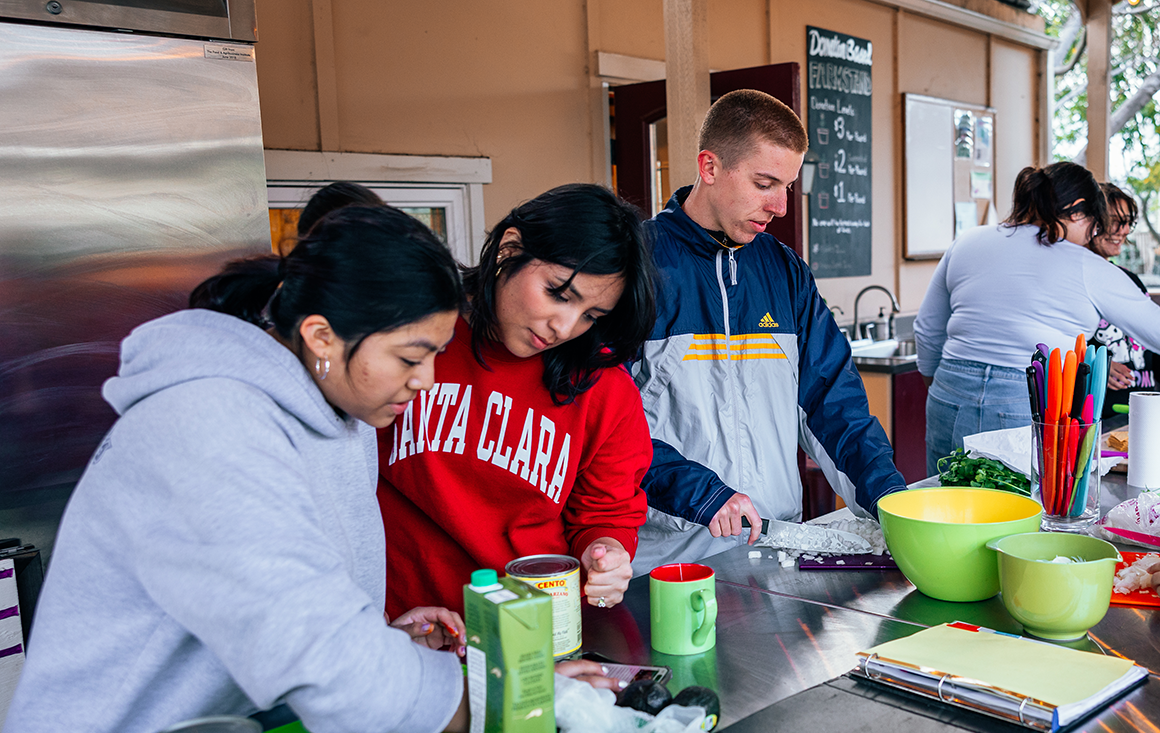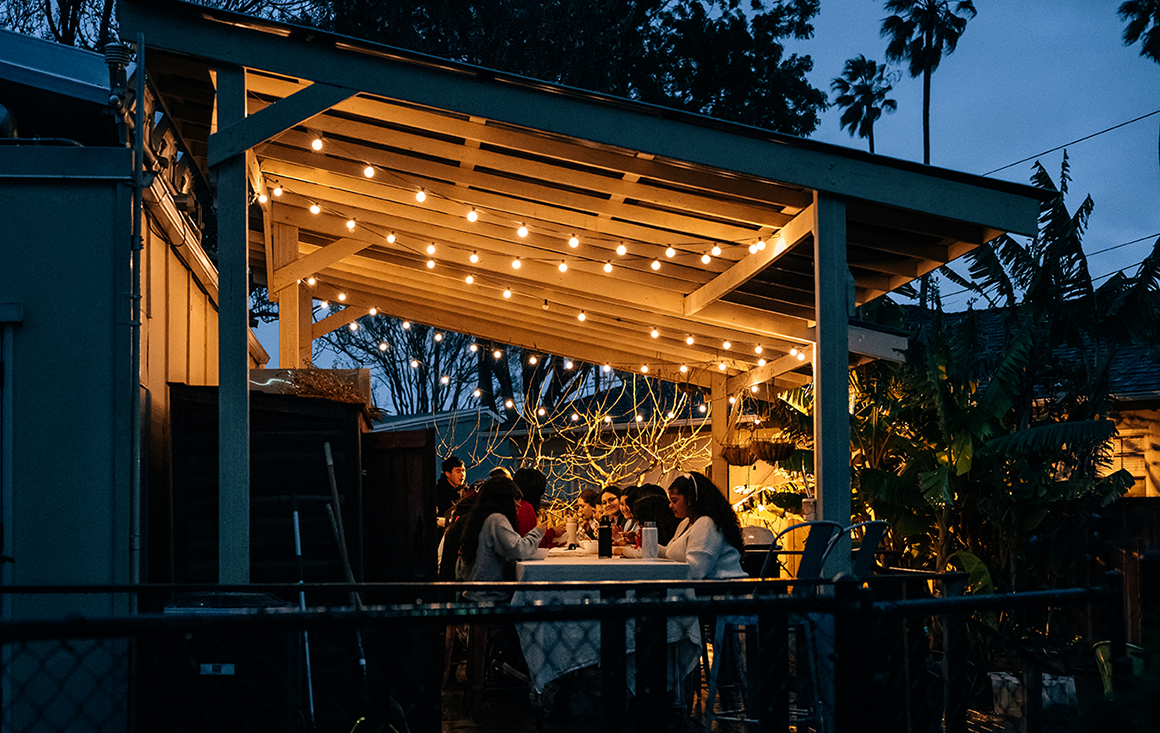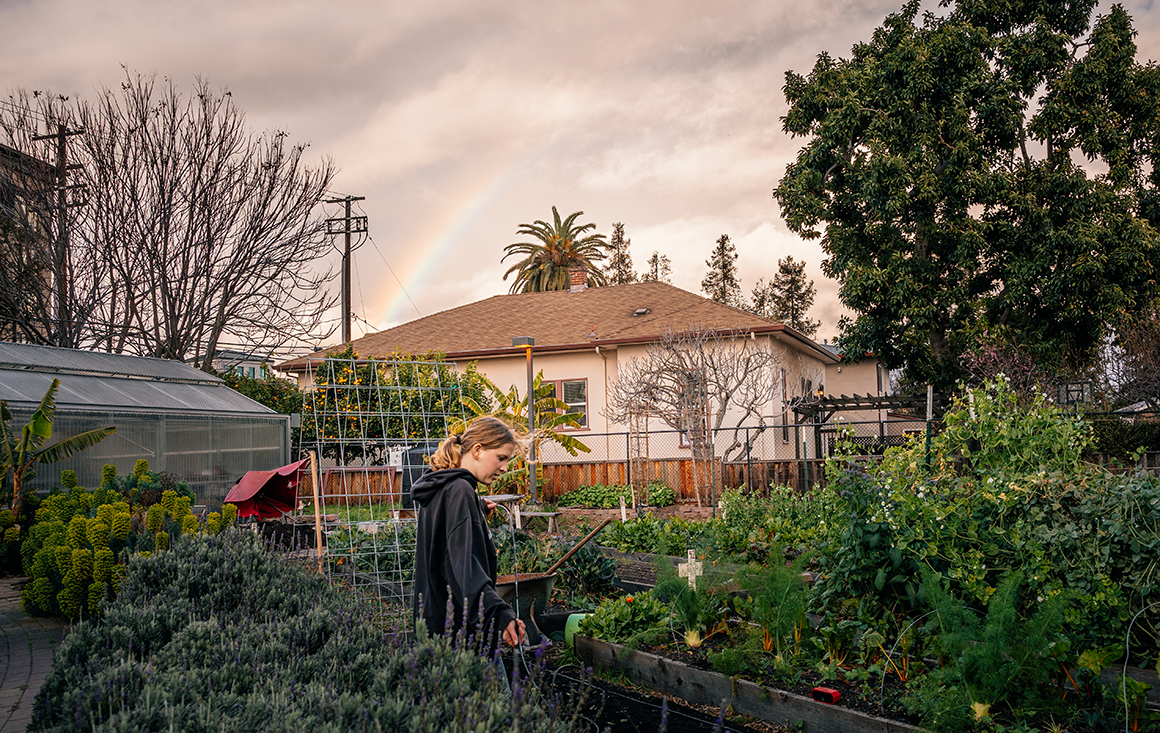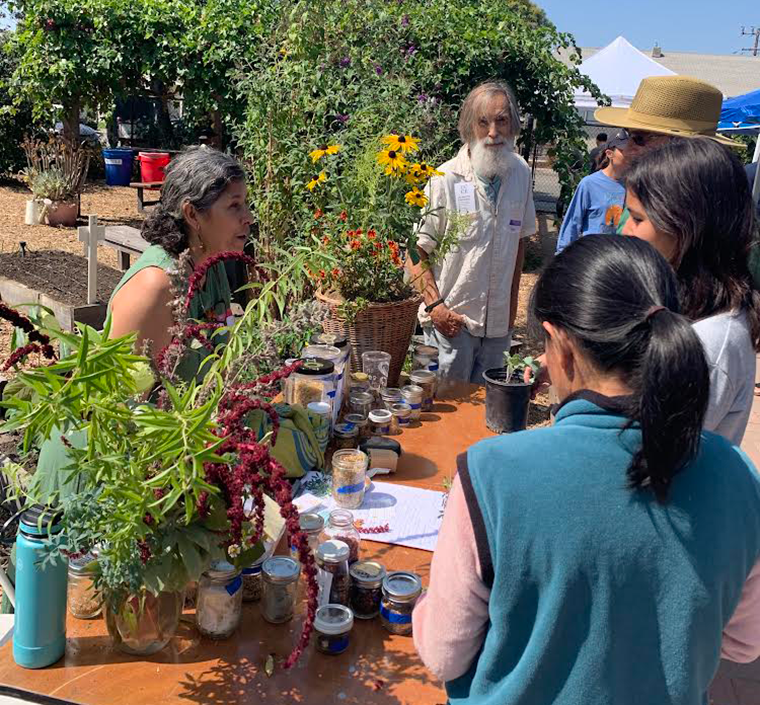Where We Break Bread

When is a meal more than a meal? According to Yasmin Urzua-Gutierrez ’25, the answer can be found in the Forge Garden, Santa Clara University’s half-acre, edible, organic garden.
This spring, she organized a Nourish Nights event hosted by Hermanas Unidas—a student club she co-chaired. The Nourish Nights program is one of the Forge Garden’s signature programs where student clubs, department faculty, and other campus groups gather and cook a plant-based meal using fresh produce from the garden.
Originally started during the COVID-19 pandemic by student workers at the Forge Garden looking to combat food insecurity and isolation during lockdown, the program has quickly expanded through word-of-mouth and offers a welcoming and safe space to build community.
“We’ve had such a diverse group of people participate in this program, like the Surfriders Club, the Sunrise Club, the Mindfulness Club, and the Rainbow Resource Center and Queer and Qualified. Once a group does it, we’ve seen that group come back time and time again,” notes Forge Garden Manager Rebecca Nelson.
Not only does the event offer a free meal to anyone in the student community, but it also teaches students how to cook with fresh produce—from tips for cutting onions to information on when different fruits and vegetables are in season.
Of course, the very act of preparing and sharing food is one of the most special parts of Nourish Nights. Urzua-Gutierrez recalls her fellow Hermanas Unidas members bonding over the similarities and differences in their family recipes for chilaquiles—debating whether or not adding avocado is sacrilege or how much water should be added to the salsa mix.
“Food is such a big thing in Latino culture,” she says. “It’s how you make friends and celebrate family. Being able to see people’s faces light up making a meal that we grew up watching our moms and dads make made Santa Clara feel like an extension of home.”
Events like Nourish Nights aren’t new for the Forge Garden, offering a beloved home-away-from-home for many students. As it celebrates its 15th Anniversary on October 25 during its Harvest Fest event, the Garden is more involved than ever in serving the community—both on-campus and beyond.

Nourishing the whole person
Every Friday morning, Nelson’s team of student workers set up the Forge Garden’s Farm Stand—a weekly market of freshly harvested produce. In the fall and winter, community members flock to get their hands on bok choy, broccoli, and juicy tangerines and oranges. In the summer, peaches, peppers, and basil are always the first to go.
But, unlike other local farmers markets, prices for this highly prized produce are donation-based, with no pressure to pay. This stigma-free pricing structure is one of the ways the Forge Garden is addressing local food insecurity, and it’s received a lot of support.
“Some folks pay more than suggested on some weeks, and on other weeks, they might give a dollar or whatever they can,” Nelson explains. “Over the last two years, we’ve seen more and more people visit the Farm Stand, especially more students. I think that’s been incredible because we do reserve that first hour just for students.”
When the college diet can easily consist of bags of Cheetos or instant ramen, eating a vegetable can feel “life-changing,” Nelson says, and it’s something that every student deserves access to.
In addition to the student hour at the Farm Stand, the Forge Garden also donates 15-20% of each week’s harvest to the Bronco Pantry, which serves students who are most in need of a nourishing meal. Last year, 800 pounds of fresh produce went to the Bronco Pantry.
But food isn’t the only thing enriching students. When midterms and finals get a little intense, it’s not uncommon for Nelson to see new faces in the Forge Garden as students pop by to get a break from studying.
“Coming to the Forge Garden, it doesn’t look or feel like campus,” Nelson muses. “Students will tell me they come here to feel like part of an ecosystem. It’s very grounding and healing from a mental health perspective as well.”

Spreading roots
Just as Santa Clara University creates globally-minded leaders, the Forge Garden also looks outward toward systemic problems and larger community solutions.
In the last year, Nelson partnered with two South Bay food justice coalitions to align the Forge Garden within the local urban agriculture ecosystem. This included joining the new Urban Growers Network and hosting a local seed swap with 90 community gardeners and 10 organizations exchanging heirloom seeds. This community-driven event is a great way to promote food sovereignty, Nelson says, which aims to create local food systems that are more sustainable, socially equitable, and resilient to climate change and economic factors like inflation or supply chain breakdowns.

The 2023 Seed Swap; photo provided by the Forge Garden
“Some of these seeds have been grown and regrown by San Josean gardeners for 30 years, so they’ve adapted to our local climate, even surviving last year’s crazy winter,” explains Nelson. “Not only do they grow well here, but these heirloom fruits and vegetables are also more diverse and nutritious than what you can find in grocery stores.”
As the Forge Garden’s reach across the South Bay region grows, there have been more and more opportunities for students interested in sustainability and food systems to get practical, hands-on experience.
For example, student gardener Abby Grimm ’24 interned at the trailblazing farm-to-table restaurant Chez Panisse, and Oliver Branham Upton ’24 went from showcasing native plants in the Forge Garden to pursuing an urban landscaping master’s degree at Harvard University.
After three years working at the Center of Sustainability, Urzua-Gutierrez has also connected her SCU-grown passion for sustainability to her future career. A few months after hosting Hermana Unidas’ Nourish Nights, she completed a public policy fellowship at Princeton that sharpened her perspective on the migrant farmworker community in her Nebraska hometown. Through a Hackworth Fellowship, she’s now continuing this research at SCU where she'll be interviewing migrant farmworkers and policymakers about ways to better protect the rights of undocumented migrants.
The sustainability movement is a predominantly-white area of study that often focuses on plants, but the predominately-nonwhite and undocumented people who harvest these plants are an integral part of the food system, she says. Without migrants, the produce that most Americans rely on would never make it to the dinner table.
“Once migrants get the opportunity to become citizens, I want to want to help with civic education so they can participate in the systems that are impacting their industries, especially agriculture,” Urzua-Gutierrez explains. “Immigration reform is one of the hottest topics when it comes to voting, but the people who are being voted upon have no say in it, so that’s the big issue that I’m trying to tackle.”
This kind of student leadership and activism is what Nelson believes will define the Forge Garden in the coming years as more students—from first years to graduate students—discover SCU’s best-kept secret.
For anyone interested in being a part of the Forge Garden’s continuing growth, she invites them to attend the Harvest Fest and 15th Anniversary Celebration on October 25. The event will include photos and guests from the garden's history, a pop-up Bucky's Closet Halloween shop, screen printing, and other activities.
“This event is a way to celebrate everyone who has been part of the Forge Garden,” says Nelson. “Thanks to them, our roots are really spreading out.”
The Center for Sustainability's Forge Garden is a half-acre edible, organic garden that serves as a hub for sustainable food system education. Forge Garden Programs aim to build a just and sustainable food system through education, collaboration, and connectivity, using the garden as a living lab for interdisciplinary learning.


